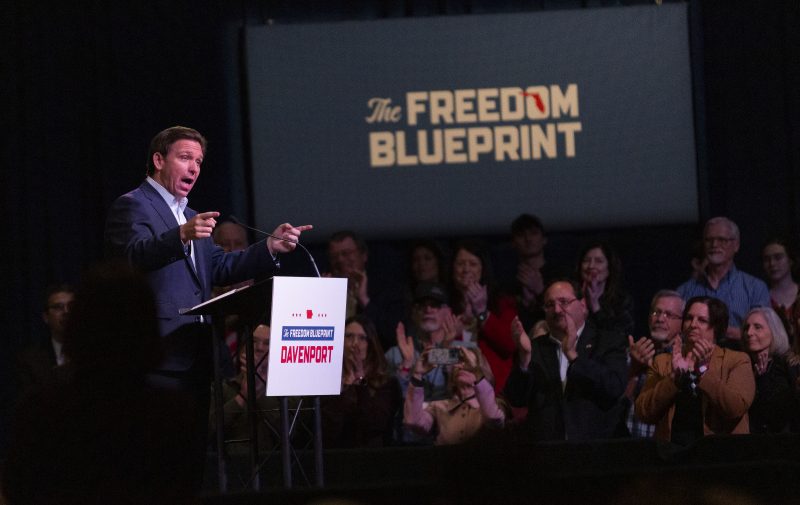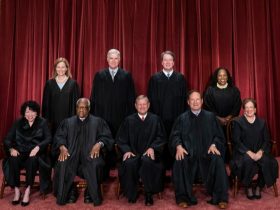Florida Gov. Ron DeSantis will declare Wednesday evening that he is running for president, using an unorthodox announcement with Twitter CEO Elon Musk to launch a long-expected campaign that many Republicans view as the most formidable 2024 primary challenge to Donald Trump.
DeSantis plans to state his intentions on Twitter in a virtual conversation with the social media platform’s billionaire executive, before joining Fox News for an interview, according to a spokesman. The launch underscores DeSantis’s embrace of conservative influencers as he looks to bypass the mainstream media he derides. It also aligns him with one of the world’s richest people — a polarizing figure who shares DeSantis’s disdain for the media and liberal critics and has quickly become one of the most prominent, provocative voices on the right.
The entrance of DeSantis will come after some upheaval in the Republican primary. Trump, the former president, has strengthened his position since the start of the year, even as he faces increasing legal peril. Other Republicans have entered the race, but all are mired in single-digits and have failed to make a dent in Trump’s commanding polling lead. And the Florida governor, once seen as a potentially dominant force in the party, is trying to regain his footing after falling well behind Trump, even as he has maintained a clear grip on second place.
DeSantis, 44, became a GOP star as a first-term governor who derided pandemic-driven shutdowns and vaccine mandates and cast himself as an enemy of what he calls “woke ideology” in the news media, major companies such as Disney and schools, where he has worked to restrict discussion of sexual orientation and gender identity.
His landslide reelection in November stood in stark contrast to Republicans’ underwhelming performance nationwide, intensifying GOP doubts about Trump’s viability in 2024 and elevating DeSantis as a possible new standard-bearer for the party. Since then, he has pushed Florida policy to the right with a crackdown on undocumented immigrants, a strict new abortion ban and other dramatic moves that have made his candidacy particularly alarming to Democrats and some civil rights leaders.
Aided by GOP supermajorities in the Florida legislature, DeSantis has racked up policy victories that excite the conservative base — but also stoked concerns among some donors and prominent Republicans that he is picking fights that will alienate more moderate voters. Some have also voiced doubts about his retail politics skills.
Tracking 2024 presidential candidates
End of carousel
Allies hope an official plunge into the 2024 race will help DeSantis turn the tide and regain momentum. “People ask me, am I paying attention to the polls … I think right now those are all meaningless,” said Bill Stern, a former state finance chair for Trump in South Carolina who is now backing DeSantis. “Let’s give him time and let him prove himself,” he said of DeSantis.
Wealthy donors will gather in Miami this week to hear from the governor’s political team and to kick off fundraising.
DeSantis’s website on Tuesday shifted to a black background with an alligator poking just above the water, while DeSantis’s wife, Casey DeSantis — by all accounts his most important adviser — shared a video Tuesday that shows the governor seeming to prepare himself before heading out on stage. Meanwhile, Trump adviser Chris LaCivita on Tuesday shared an image of an alligator hanging from a tractor, while a spokeswoman for a pro-Trump super PAC ridiculed DeSantis’s announcement plans as “out-of-touch.”
DeSantis has signaled he will campaign on his combative approach to critics and willingness to dig in on some of the country’s most polarizing debates. At the same time, allies frame him as someone who eschews Trump’s daily drama and is better suited to win a general election and enact a conservative agenda. He traveled the country this year in advance of his announcement, telling crowds that “Florida is where woke goes to die” and criticizing Democratic-led cities and states.
DeSantis has largely ignored Trump’s broadsides. But the governor and a super PAC supporting him, Never Back Down, have started to push back on some of Trump’s attacks and explicitly make the case that DeSantis is more electable than Trump. The governor is entering the race with national name recognition, long lists of legislative endorsements in early-nominating states and formidable financial resources, with well over $100 million potentially at his disposal between the super PAC and another political committee.
His bid will test GOP voters’ willingness to move on from Trump for a more disciplined candidate who in many ways has emulated the former president.
Other 2024 hopefuls are trying to position themselves as the leading Trump alternative if DeSantis continues to lose steam. Former U.N. ambassador Nikki Haley, former Arkansas governor Asa Hutchinson, Sen. Tim Scott (R-S.C.) and lesser-known candidates have already declared campaigns, while others such as former vice president Mike Pence could also jump in the race.
DeSantis joined Congress in 2013 with an elite résumé — a law degree from Harvard, a history degree from Yale, where he captained the baseball team, and service in the Navy, where he was a legal adviser to SEAL Team 1 in Iraq. He had recently published a book criticizing the policies of then-President Barack Obama and soon became a founding member of the Freedom Caucus, home to some of the House’s most conservative members.
He won the 2018 GOP primary for Florida governor with Trump’s endorsement, besting an establishment-backed candidate by 20 points — an outcome widely interpreted as a sign of Trump’s influence in the party. He defended the president often on Fox News and made national headlines with an ad in which he encouraged one of his children to “build the wall” with blocks and read Trump’s book to another. (“Then, Mr. Trump said, ‘You’re fired!’”)
DeSantis won the governorship by a razor-thin margin and at first focused on less partisan issues, promoting increased funding for education, hurricane recovery and environmental projects such as restoration of the Everglades. Then, in 2020, he became a star of the GOP’s opposition to coronavirus restrictions. He lifted his state’s pandemic restrictions earlier than many other governors, denounced mask mandates and helped ban local governments and private businesses from enforcing vaccine mandates.
Criticized as dismissive of public health and the thousands of Floridians who died of covid-19, DeSantis said he was protecting people’s livelihoods.
“We followed freedom, and that’s the reason why Florida’s doing better,” he said in 2021.
Since then, DeSantis has championed causes dear to the Republican base, raising his stock with primary voters but also drawing a backlash from critics across the country and legal scrutiny.
A federal judge in 2021 blocked an “anti-riot” law DeSantis championed, saying it could allow “rogue actors” to “criminalize the protected speech of hundreds, if not thousands, of law-abiding Floridians,” and also objected to parts of a “Stop Woke Act” limiting discussions of race in public colleges and universities.
“This is positively dystopian,” U.S. District Judge Mark E. Walker said of the state’s arguments while pausing the law pending further review. This year, an appeals court upheld the injunction.
DeSantis’s state surgeon general put out guidance that puberty blockers and “social gender transition” — which includes the use of new names, pronouns or clothing — should not be options for children and adolescents. The governor’s administration this year expanded the state’s restrictions on school discussions of LGBTQ issues, banning teaching about sexual orientation or gender identity throughout K-12 public schools with limited exceptions for reproductive health courses.
DeSantis also disparaged coronavirus vaccines (after once championing them) and pushed to investigate “wrongdoing” related to the shots — and outraged Democrats and human rights advocates last fall by flying undocumented immigrants from border state Texas to Martha’s Vineyard in Massachusetts. Local officials said they were unprepared; migrants said they were misled. But many in the GOP applauded the stunt as a headline-grabbing protest of the Biden administration’s border policies.
Liberal-leaning cities that call themselves “sanctuaries” for undocumented immigrants are “doing it so that they feel good,” DeSantis said in September. “But they don’t want to actually have to deal with the consequences of the policies that they advocate for all of you.”
He has not repeated Trump’s false claims that the 2020 election was “stolen,” but he has avoided directly answering questions about the claims and embraced the resulting GOP push for new voting restrictions. Highly publicized arrests by Florida’s new elections police force drew an outcry last year, as mostly Black defendants said they believed they were eligible to vote despite their felony records and had their registrations approved by the state Division of Elections.
DeSantis toured the country during the 2022 midterms, aligning himself with many Trump-endorsed candidates — including far-right nominees such as Kari Lake and Doug Mastriano. His nearly 20-point reelection victory over Democrat Charlie Crist last fall cemented Republicans’ recent dominance in Florida, long viewed as a swing state. At the same time, Trump-endorsed candidates lost critical races elsewhere across the country in a year when the GOP had expected a red wave.
“We have rewritten the political map,” DeSantis declared the night of Nov. 8, addressing supporters who chanted “Two more years!” — already looking to 2024.
Since then, however, DeSantis has faced increasing scrutiny and staked out positions that some supporters view as missteps. He alienated some donors and hawkish Republicans earlier this year when he called Russia’s invasion of Ukraine a “territorial dispute” not central to American interests, aligning himself firmly with Trump on a divisive foreign policy issue for the GOP. He signed a six-week abortion ban in Florida that many worry will be politically costly — and that DeSantis himself has appeared reluctant to tout in public.
Rivals have also zeroed in on DeSantis’s reputation for standoffishness — despite the governor’s efforts to spend more time meeting and talking to local activists and voters in early-nominating states — and the latest turns in his battle with Walt Disney Co., one of Florida’s largest employers.
DeSantis moved last year to punish Disney after it opposed a Republican-led bill to ban public schools from broaching gender identity and sexual orientation before fourth grade. The governor has highlighted his tangle with Disney in speeches, betting it’s a winner with Republicans, and escalated the fight this year after Disney quietly undermined his attempt to take control of a special district home to Disney World.
Trump allies have ridiculed DeSantis for being “out-negotiated by Mickey Mouse,” while prominent Republicans such as House Speaker Kevin McCarthy (R-Calif.) have suggested DeSantis should back off the issue. Disney sued DeSantis in late April, alleging political retaliation.
Trump began to attack DeSantis openly just before his reelection, nicknaming him “Ron DeSanctimonious,” and only escalated his insults afterward. DeSantis stuck to subtler rebukes, making a point to note the “porn star hush money payments” at the center of a New York prosecutor’s case that Trump falsified business records. Trump has pleaded not guilty.








